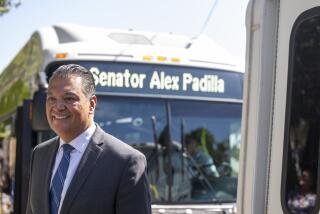Legislature takes aim at urban sprawl
Will Californians drive less to reduce global warming? Maybe not on our own -- but state officials are ready to nudge us.
The Legislature is on the verge of adopting the nation’s first law to control planet-warming gases by curbing sprawl. The bill, sponsored by incoming state Senate leader Darrell Steinberg (D-Sacramento), is expected to pass the Assembly today and the Senate on Friday.
Gov. Arnold Schwarzenegger has not taken a position on the bill, but sponsors expect him to sign it once the state passes a budget.
The legislation, SB 375, would offer incentives to steer public funds away from sprawled development. The state spends about $20 billion a year on transportation, and under the new law, projects that meet climate goals would get priority.
An earlier version of the bill was blocked last year by the building industry and by organizations representing cities and counties. Developers feared their suburban projects would be delayed or halted. Local officials were wary of ceding zoning powers and transportation planning to the state.
But momentum for the legislation has grown as the state seeks to implement its landmark 2006 global warming law, which would slash California’s greenhouse gas emissions to 1990 levels by 2020, a 30% cut from expected emissions. To accomplish that, state officials say, fuel-efficient cars and factories won’t be enough. Subdivisions, commercial centers and highways must be planned so that Californians can live and work closer together, reducing the amount they drive.
“Our communities must change the way they grow,” Steinberg said.
A compromise 17,000-word bill was hammered out this month and endorsed by builders, environmentalists and local officials. It requires the state’s 17 metropolitan planning organizations and its regional transportation plans to meet concrete targets to reduce global-warming emissions. The targets will be set by the state Air Resources Board. “California led the way into our culture of car dependence, so it is only appropriate that the state lead the way out,” said David Goldberg, a spokesman for Smart Growth America, a Washington-based nonprofit. The law could “provide a model for other states,” he added, noting that the number of miles Americans drive has risen at more than double the rate of population growth in recent decades.
Scientists agree that the earth is heating up at a dangerous pace, in part because of excess carbon dioxide and other gases from vehicles, power plants and other human sources. The expected effects in California include coastal flooding from rising sea levels, reduced water supply and the disappearance of many species of plants and animals, according to researchers.
The legislation would lead to better-designed communities and save consumers on gas bills, advocates said. Thomas Adams, board president of the California League of Conservation Voters, called it the most important land-use bill in California since the Coastal Act in the 1970s. “It is also the first legislation to link transportation funding with climate policy,” he said.
--
More to Read
Get the L.A. Times Politics newsletter
Deeply reported insights into legislation, politics and policy from Sacramento, Washington and beyond. In your inbox three times per week.
You may occasionally receive promotional content from the Los Angeles Times.











